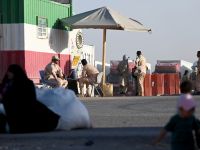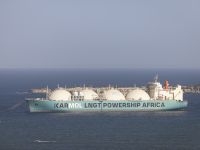Twelve people, including the first member of Israel's security forces, were killed and almost 300 injured in bloody clashes that swept across the Palestinian territories Sunday and spilled over to Israel.
More than 250 Palestinians and Arab Israelis were also injured in exchanges of fire and shootings by Israeli forces against stone-throwing demonstrators in violence that has plunged the stumbling Middle East peace process into further turmoil.
Israel's acting Foreign Minister Shlomo Ben Ami blamed Yasser Arafat's Palestinian Authority for the clashes -- the worst in four years -- but urged a return to the negotiating table.
"We should not allow the tragic clashes to derail the process," he told reporters in Tel Aviv, with negotiations all but stalled since the collapse of the US-hosted Camp David summit in July.
The fighting, which has claimed the lives of 34 Palestinians, an Israeli Arab demonstrator, and an Israeli Arab member of Israel's border guards over the past three days and left about 1,000 wounded, erupted over a controversial visit Thursday to a hotly disputed holy site in east Jerusalem's Old City by Israeli right-wing opposition leader Ariel Sharon.
Islamic militants called on Palestinians to launch a "holy war" against Israel and begin a new Intifada like the seven-year violent popular uprising against the occupation, which ended with the 1993 Oslo peace accords.
In the deadliest confrontation Sunday, five people, most believed to be members of the Palestinian security forces, were killed in gun battles in the West Bank town of Ramallah while in Nablus four were killed, including a seven-year-old boy and the Israeli border guard.
In the Gaza Strip, one 10-year-old boy was reported clinically dead after being caught up in violence in Rafah near the border with Egypt, and another Palestinian man was killed near the Jewish settlement of Netzarim.
In northern Israel an Arab was shot dead by police near Umm el-Fahm during a violent demonstration against Israeli repression in the Palestinian territories, relatives said.
Around 50 Arab Israelis were injured.
Violent clashes also erupted in Hebron and Bethlehem and surrounding areas where a total of more than 130 people were hurt, and in Tulkarem and Jenin to the north of the West Bank.
In an unprecedented move the army said Sunday it was closing certain roads to civilian traffic and would progressively reopen them under army protection.
The measure could serve to split up disparate areas administered by the Palestinian Authority thus improving the defense of isolated Israeli settlements.
Arafat warned in an interview published Sunday in the Saudi newspaper Okaz that he was ready to use any option including war to face up to Israel.
"We are always looking for peace, but if we are forced to defend ourselves, we will not hesitate," he said.
Jordan's King Abdullah II also blamed Israeli "provocation" for the clashes while Egyptian President Hosni Mubarak and Syrian President Bashar al-Assad agreed that they might have "negative repercussions" for the peace process.
The violence continued despite Prime Minister Ehud Barak's call for Arafat to intervene personally and a meeting overnight between Israeli and Palestinian security officials aimed at restoring calm to the region.
"Unfortunately I cannot see that it (the meeting) had any effect," said Giora Eiland, head of the Israeli army's operations directorate.
The Palestinian Authority Sunday called on Israel to "cease fire immediately," but a spokesman for Barak said Israel would only do so if the Palestinians did likewise.
However, he said the two sides were in contact, and that Barak had spoken to US President Bill Clinton and Spanish Prime Minister Jose Maria Aznar who were attempting to mediate.
Sharon, whose visit set off the wave of clashes and who is blamed by the Palestinians for the massacre of hundreds of refugees in Lebanon 18 years ago, rejected any responsiblity.
"Erupting in violence is a means for Arafat to put pressure on Israel and the Americans to get what he wants," the Likud party leader said in a statement.
Control over the site, known to Jews as Temple Mount and to Muslims as Haram al-Sharif or Noble Sanctuary, is the key sticking point in efforts to reach an Israeli-Palestinian peace accord -- NABLUS, West Bank (AFP)
© 2000 Al Bawaba (www.albawaba.com)







